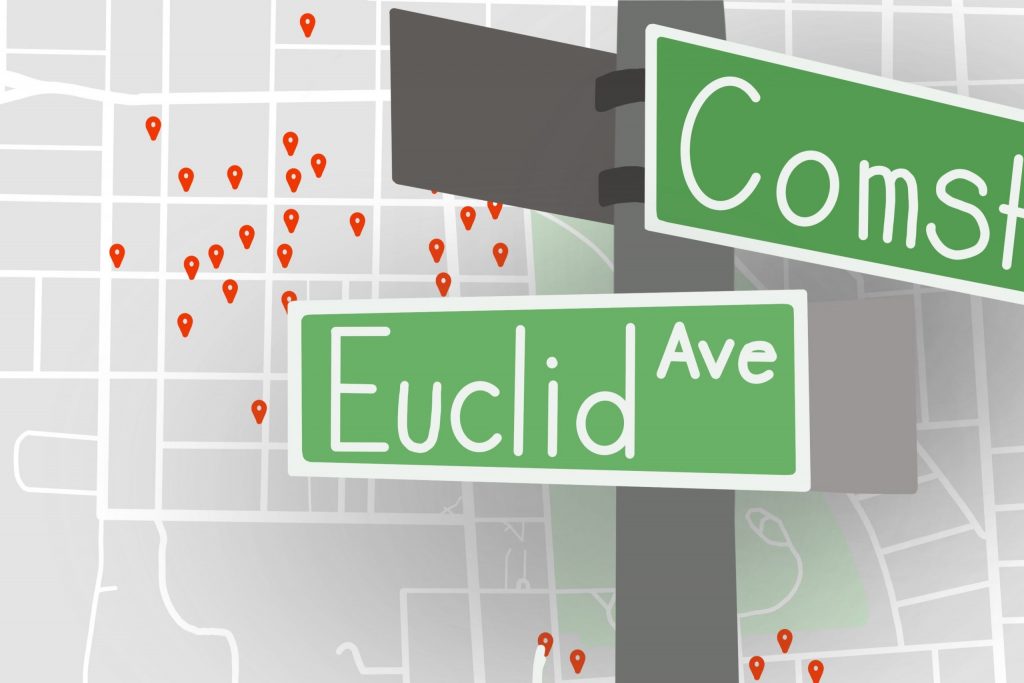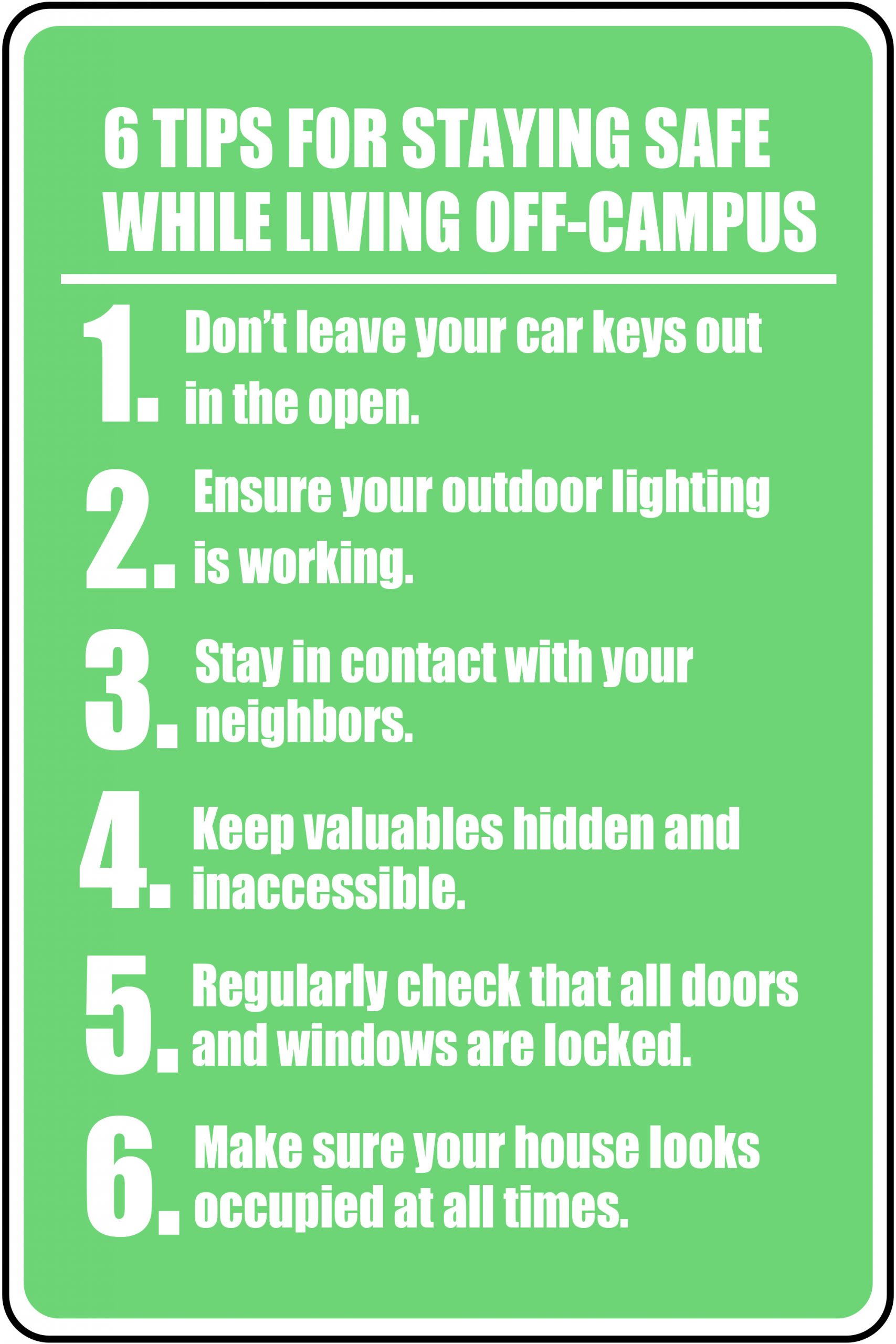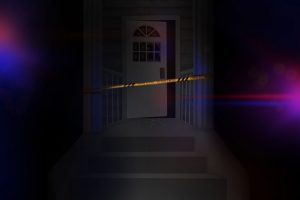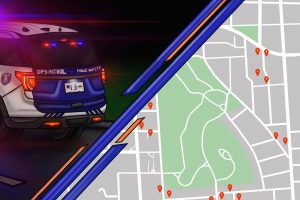Safety advice suggested for students living off-campus
Off-campus safety advice you can use

As the new semester begins, for many students, moving from an on-campus residence hall into an off-campus house or apartment may represent a new era of young adulthood that comes with a feeling of freedom and independence. However, living in off-campus neighborhoods can mean sacrificing a bit of that added safety that comes with having a heavy on-campus presence of the Department of Public Safety.
According to data provided by the DPS crime log, there have been 74 off-campus incidents of burglary, larceny, property damage, robbery and vehicle theft between Aug. 2021 and March 2022. DPS Deputy Chief John Sardino said that the department has observed an uptick in off-campus burglaries in recent years. Burglary, not to be confused with larceny or robbery, involves the unlawful entry into a property with the intent to commit a crime, especially but not exclusively theft.
Marissa Solomon, a current Syracuse University senior and Livingston Ave. resident, experienced an occupied burglary first-hand October of last year during her first semester living in University Neighborhood. Although she and her three roommates took all of the precautions they thought they were supposed to, Solomon still found herself face-to-face with the perpetrator in a frightening incident that changed her approach to safety.
“You can think you’re doing everything right and it can still happen. It’s unexpected and you never think it’s going to happen to you,” Solomon said. “Anticipating it and preparing for it in advance is going to help you both keep that peace of mind and have fortifications for potential issues in the future.”
While Solomon’s burglary incident occurred even though she took all of the recommended precautionary measures, her experience was more of an exception than the norm.
Chrissy Sen and Erica Thomas of O.P.R. Developers, who oversee around 70 to 80 buildings in neighborhoods around campus, said that almost all of the off-campus incidents they’ve seen in the past had been crimes of opportunity. A crime of opportunity is when perpetrators take advantage of a resident who makes a common mistake, such as accidentally leaving a ground-floor window unlocked. Sen and Thomas say they have rarely seen incidents in which a criminal has used force to enter one of their properties unlawfully.
Because many students who move off-campus are first-time renters, the neighborhoods surrounding campus may be especially vulnerable to potential criminal activity. While off-campus crime rates may seem alarming to students who are soon moving out of residence halls for good, there are several preemptive safety measures you can take to be as prepared as possible in case an incident occurs.
Regularly check to make sure all doors and windows are locked
In a public safety informational notice sent out on September 2nd regarding off-campus burglaries, DPS reported that many of this semester’s burglaries occurred because perpetrators were able to obtain entry through unlocked doors and windows and that “to date, there have been no reported incidents where forced entry occurred.”
While checking that all doors and windows are locked may feel like second nature to some, other students may need to make a mindful effort to do so. Sardino said that because most first-time renters are moving from residence halls to off-campus neighborhoods, many of them are accustomed to the safety of living in a dorm.
“We did a study five or six years ago and found that a lot of students who live in residence halls leave their doors open,” Sardino said. “If you’re used to living that way for a year, maybe some of that translates to when you move off-campus.”
For other students, the assumption of safety may stem from their hometowns and upbringing. “Some people are coming from neighborhoods at home where they don’t even need to lock their doors and windows,” Thomas said. When these students move into a neighborhood in which crime can be a real issue, it can be difficult at first to develop that habit.
If making sure everything’s locked isn’t a part of your daily routine yet, try setting a reminder on your phone every night or putting a note-to-self on your desk.
Don’t leave your car keys out in the open
In addition to locking doors and windows, DPS encouraged residents in a Sept. 12 notice to avoid leaving keys in the open. Sardino said he’d noticed an unusual increase in the number of vehicle thefts, many times because car keys are left out in the open and easily accessible to thieves who want to go on a joyride.
“Whoever’s committing these burglaries is looking for the car keys and taking the cars. That’s something that’s different than in the past,” Sardino said. “It used to be grabbing valuables that could fit into pockets or a backpack so they could leave the premises and still be undetected as they walked around the neighborhood.”
So the next time you go to toss your car keys on the kitchen counter, consider putting them somewhere less visible, such as your bedroom desk drawer.
Make sure your house looks occupied at all times
In general, potential criminals are more likely to avoid houses that look like they have people inside, as breaking into those properties poses a much higher risk than stealing from an empty house. In addition, because occupied burglary is a higher level offense than unoccupied burglary, making it seem like there are people in your house may make someone think twice before trying to enter.
Sardino said that the degree of burglary a criminal is charged with largely depends on whether or not someone is home at the time of the unlawful entry. Third-degree burglary typically occurs when no one is home; in contrast, when a residence is occupied, a criminal may be charged with first or second-degree burglary, depending on whether or not anyone was hurt as a result of the incident. First-degree burglary is the most serious type of burglary, which is a class B felony and can result in a maximum sentence of 25 years in prison. Second-degree burglary is a class C felony with a maximum sentence of 15 years in prison, and third-degree burglary is a class D felony with a maximum sentence of seven years in prison.
Sen and Thomas said that over winter breaks and other periods in which tenants won’t be home for a long time, they’re often asked to take in packages so they don’t collect on the porch over time. If you’re planning on leaving for an extended period, consider asking your friend or landlord to keep your mail until you get back, which ensures important deliveries won’t get stolen while you’re gone and also prevents your home from looking vacant, which can attract burglars.
Both Sen and Thomas and DPS recommended buying a timer that automatically turns on your lights at a specific time to signal to others that people are home, even when that’s not the case. In their public safety informational notice, DPS also discussed the benefits of motion-sensor lights.
Ensure your outdoor lighting is working
Even when you are home, making a simple effort to turn on your exterior lights before going to sleep can make a huge difference. “Almost every house has a porch light or a light above every entrance,” Thomas said. “Leaving those on protects your house and makes the entrances to your home more visible.” Thomas said that while turning on outdoor lights may not seem like a big deal, taking that extra step to do so can deter potential criminals from approaching your door, as it increases the chance that a neighbor or passerby might be able to see them.

Keep valuables hidden and inaccessible
DPS recommends avoiding placing valuable items, such as credit cards, cash or expensive jewelry near windows, as doing so makes them extremely accessible and attractive to potential thieves.
In addition, students should try their best to keep a record of their most valuable possessions by taking photos of them and writing down any and all serial numbers. Whenever possible, place tracking tags on anything you don’t want to be stolen and mark or engrave any items of value.
Stay in contact with your neighbors
Especially when living in off-campus neighborhoods, it can be especially beneficial for students to get to know and exchange contact information with neighbors and other students living in the area. When suspicious activity occurs near and around your off-campus house, it helps to have a network of people nearby so you can alert each other if you see anything potentially dangerous or unsafe.
Solomon stressed the importance of knowing your neighbors and recalled when someone on her street notified her roommate when they saw a stranger acting suspiciously near their house. “Our neighbors saw someone in our backyard hiding behind one of our cars,” Solomon said. “They called one of my roommates and they were like, ‘Just so you know, this is happening.’” Soon after, Solomon and her roommates called SPD who were able to send an officer to patrol the area.
Be aware of your surroundings
According to several safety strategies outlined by DPS, students should avoid walking alone in general and aim to “walk in groups of three or more, especially after dark.” As you’re walking, try to pay attention to your environment and avoid wearing headphones, as they may distract you from what’s going on around you
If you aren’t able to walk in a group, students can either use the campus bus system or the Safety Escort Services offered by DPS and Parking and Transportation Services.
DPS has also encouraged all Syracuse University students and faculty to download the newly announced Orange Safe app, which offers several safety resources for those living both on-campus and off-campus. Through features provided with Orange Safe, users can directly communicate with 9-1-1 or DPS in an emergency, share a destination and turn on a safety timer when walking alone, submit tips about suspicious activity or unsafe situations to the DPS dispatch team, receive campus notifications and instantly access important online resources.
Thomas stressed the importance of calling the police if you see suspicious activity around your neighborhood as it could prevent future crimes from occurring and help keep the surrounding areas safe. Call DPS at 315-443-2224 or use the Orange Safe app to report activity on-campus. For off-campus activity, call the Syracuse Police Department at 315-442-5111.
Consider investing in safety devices
From pocket-sized gadgets that attach to your keys to in-house security systems, looking into added safety devices to keep on your person or in your property can provide an extra layer of safety off-campus.
Solomon said that after the break-in, she made an effort to purchase self-defense weapons, including a crowbar and mallet, to keep in the house in case of an emergency. She and her roommates also installed a home security system with motion detectors and individualized PIN codes for each roommate for even more protection.
To take with her when she leaves the house, Solomon keeps pepper spray in her purse and a handheld security alarm called Care Go, which features a GPS tracker and can alert loved ones when feeling unsafe.
The Bigger Picture: Changing trends in off-campus crimes and recovering from a break-in
While law enforcement is not unfamiliar with handling off-campus crimes against students, many shifting trends regarding the types of incidents occurring, frequency and perpetrators have recently affected community members living in neighborhoods surrounding SU. In addition to taking precautionary measures while living off-campus, another great way to stay safe is by remaining informed about happenings and current crime patterns in the community.
For students like Solomon who have been victims of break-ins while living off-campus, the experience may understandably feel like an extreme violation of privacy and safety. While living through a burglary is scary and traumatic, several students have opened up about their break-in stories and their experiences coping and recovering from the incident. For burglary or other off-campus crime victims looking for support, the Barnes Center at The Arch offers numerous resources regarding trauma counseling.








